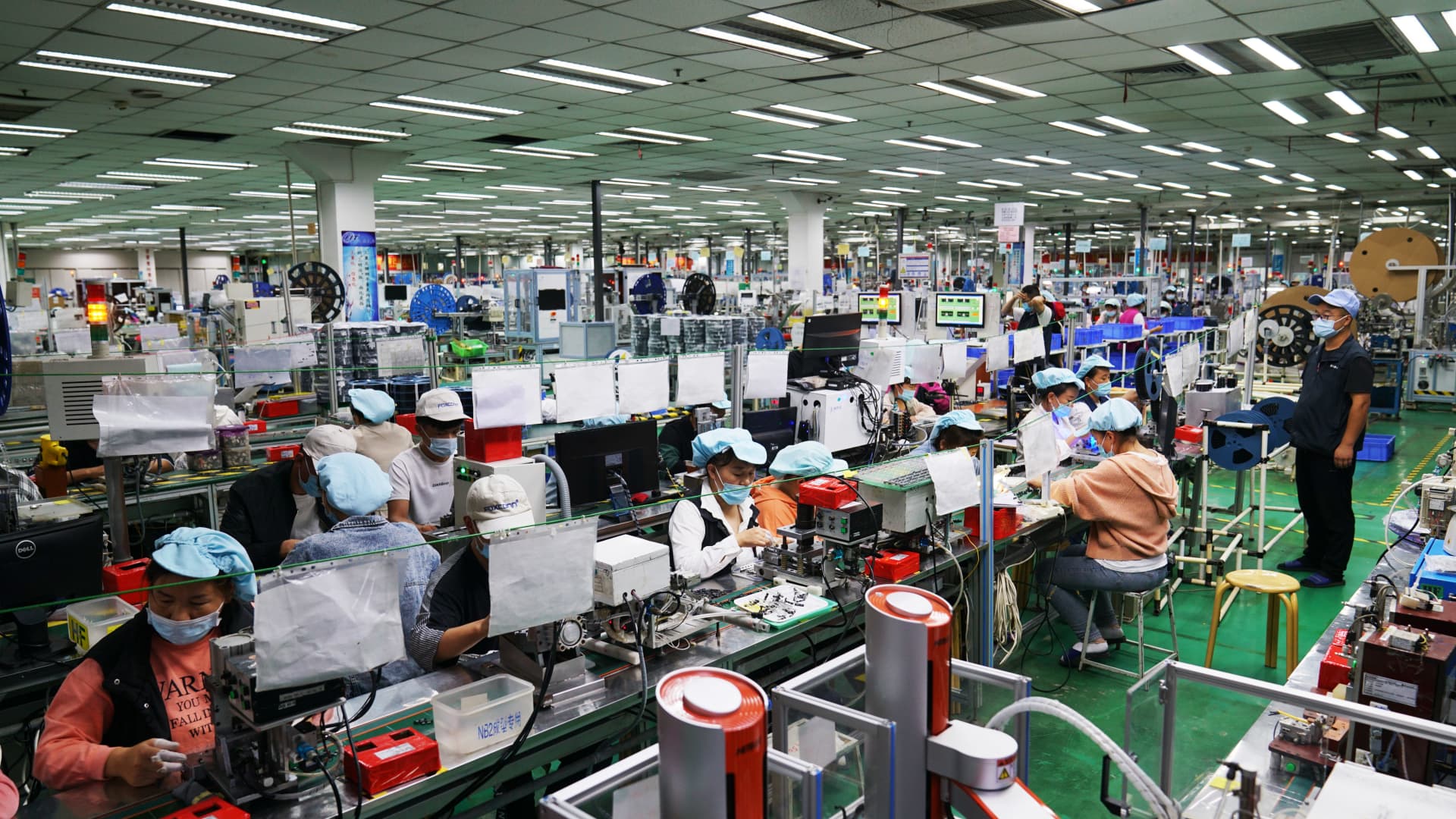BEIJING — China is pulling out all the stops to keep multinationals like Apple and its supplier Foxconn in the country.
Such efforts to attract foreign investment come as the pandemic and geopolitical tensions push companies to diversify their supply chains away from China.
For the first time in 25 years, the American Chamber of Commerce in China found that less than half the respondents to its annual survey ranked China as a top three investment priority. The number of companies which are considering or starting to relocate their manufacturing and sourcing outside of China rose by 10 percentage points from a year ago, the survey found.
The majority of respondents don’t plan to relocate their supply chains, the AmCham report said.
The survey was conducted last fall, and results hadn’t changed significantly since China ended its stringent Covid controls, AmCham said. China’s Commerce Ministry didn’t respond to a request for comment.
After such a drop in sentiment, China is working hard to keep foreign businesses investing — and supporting domestic growth. The Commerce Ministry said Thursday that for the first time, it would launch events for an “Invest in China Year.”
In a sign of how hard local governments are trying to attract foreign dollars, top officials from Henan province in central China personally welcomed Foxconn Chairman Young Liu last week during his visit to his company’s factory there, the province announced.
Foxconn operates the world’s largest iPhone manufacturing facility in Henan’s capital, Zhengzhou.
The party secretaries of both Zhengzhou city and Henan province met with Foxconn — along with the mayor and governor, state media said. In China, the ruling Chinese Communist Party takes the lead in decision making, and such high-level participation in the meeting with Foxconn indicates any matters discussed can be implemented more quickly.
During a Covid outbreak and subsequent lockdown last year, Foxconn’s factory in Zhengzhou became a hotspot of attention when some of its roughly 200,000 workers decided to leave and walk home.
Apple later said the Zhengzhou factory disruptions would delay deliveries of some iPhone 14 models.
China ended its stringent Covid controls in December. By February, Foxconn’s Zhengzhou factory was producing at full capacity, with staff working two shifts to meet high client demand, factory manager Wang Xue told local media.
Foxconn confirmed its chairman visited Henan and planned to collaborate with the local government on projects. But the company did not share details on those investment plans, or whether they have any intention to shift production out of China.
China says other companies are coming
China is eager to play up how other multinationals are interested in local business opportunities, especially now that international borders have reopened.
Senior executives from Apple, Pfizer and Mercedes-Benz are among those wanting to visit China to discuss business, the Ministry of Commerce spokesperson said at a press conference last week.
The spokesperson noted there are dozens of multinational corporates talking to the ministry about such high-level visits.
Mercedes-Benz confirmed to CNBC its CEO Ola Kallenius is planning to visit China. Pfizer had no comment. Apple did not respond to a request for comment.
Overseas marketing tour
China is also visiting potential investors in their home countries.
After a top government meeting in December called for greater efforts to attract foreign capital, many government-led groups have traveled abroad to make sales pitches for China.
Wang Jinxia, deputy director of Qianhai — an economic development zone in Shenzhen — led a group to Dubai, Singapore and London in February to drum up investment interest.
He described the visits as achieving “remarkable results” — but did not elaborate. He also noted “serious challenges” to attracting foreign investment. Those include unfair competition with local players in China due to industrial policies, lack of legal protection for foreign business in China and geopolitical risks, Wang said.
The Biden administration has increased restrictions on U.S. business with China, such as curbs announced last year on U.S. businesses and individuals working with Chinese partners on the most advanced semiconductors.
It’s not clear to what extent other restrictions will be announced.
To be clear, international investment is still coming into China at a steady clip.
Foreign direct investment rose by 14.5% in January from a year ago to 127.69 billion yuan ($18.39 billion), according to China’s Ministry of Commerce. That’s faster than the 6.3% increase for all of 2022.
South Korea, Germany and the U.K. were the largest sources of such foreign investment in 2022, the ministry said, without mentioning the U.S.
For a Chinese region such as Henan, keeping or growing investment from foreign businesses is a lifeline. Official data showed that in 2019, Foxconn’s iPhone factory accounted for 84% of the entire province’s exports.
China’s Commerce Minister Wang Wentao on Thursday made a relatively rare public acknowledgement of foreign businesses’ longstanding complaints about government procurement policies that favor local Chinese businesses.
Addressing those issues are “priorities for our work,” he said in Mandarin, translated by CNBC. “We will study and introduce policies and measures together with relevant departments to ensure foreign businesses’ equal participation.”
